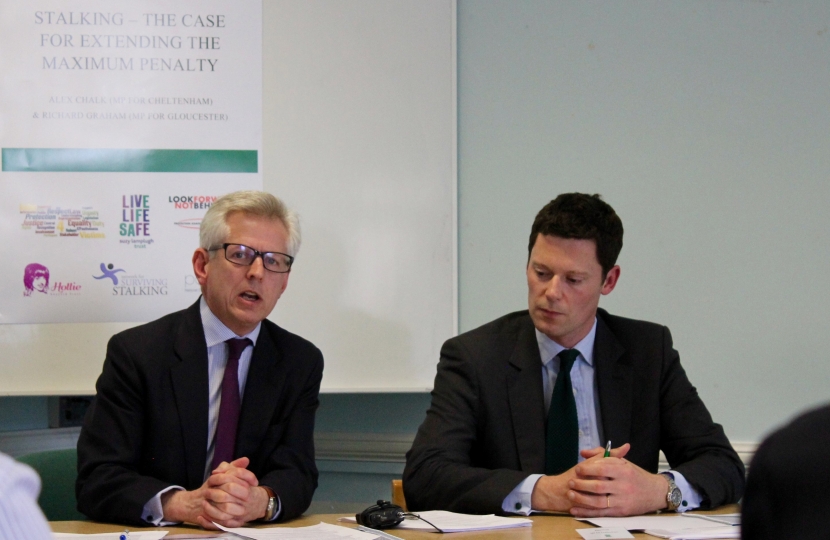
Until May 2015 all I knew about stalking was what I’d read in the papers, and heard from some colleagues in Parliament (a surprising number of whom have been stalked). But then I learnt about Dr Eleanor Aston, a GP in Gloucester and Cheltenham resident.
Ellie doesn’t fit the general preconception of people who get stalked. She’s a doctor, not a film star or publicity craving celebrity. And for eight years one of my constituents, Raymond Knight, stalked her. He made over a hundred visits to her office. He slashed her tyres, cut a water pipe at her home and showed up at birthday parties where her children were present. He sent her foul packages and probably tried to burn down her house, though this wasn’t proved. When he came out after a brief prison sentence within 24 hours Dr Aston got an anonymous letter with three words: ‘guess who’s back?’
Raymond Knight made Ellie Aston and her family’s lives absolute hell, as Judge Jamie Tabor noted when sentencing him again last year. He judged Mr Knight was a significant risk of doing this hard working GP and mother serious harm, and he said that if he could put Raymond Knight behind bars for longer he would. But the law didn’t allow a longer sentence than 5 years – which translates into about two years actually in prison.
That is less than you can get for stealing a Mars bar from a shop. The Judge felt the law needed changing and common sense meant this simply couldn’t be right. Alex Chalk, Ellie’s MP, and I both felt we should do something. So we have.
Alex had an adjournment debate on the issue and spoke to Justice Secretary Michael Gove. I raised it at Prime Minister’s Questions and we discussed the law on stalking with Justice Minister Dominic Raab together. We pooled resources, and decided to advance from a local horror story to a national report. This was hugely helped by the fact that Alex is a distinguished lawyer. Our offices researched widely into stalking and sentences, taking evidence from victims. Stalking charities like the Suzie Lamplugh Trust, the Paladin Trust and many other individuals kindly shared their experiences and wisdom with us. what did we learn?
Firstly that stalking is often obsessive and can go on for years: but that victims sometimes wait for as many as 100 incidents before reporting them to the police. Then we found that the average custodial sentence served for stalking is only 10 months, although families can often be devastated by released stalkers immediately re-offending: this is true of almost half those convicted. I met a constituent who has been so badly stalked by a former partner that she had to abandon her job and her family, and lives in a safe house far from Gloucester. An expert from the University of Gloucestershire, who also sits on Domestic Homicide Review Boards, explained most of the cases she sees have some link to stalking.One campaigner said: “This is about murder prevention.”
We concluded that the law, in too many cases, wasn’t doing its job – either to protect the victim and her family for very long, or to allow for treatment of a serious mental health issue effectively. And this strengthened our determination to achieve something worthwhile, to make sentences longer for the most serious stalkers, protect the stalked person and family better, and pave the way for recommendations from people better qualified than us on rehabilitation. We decided to go for a single, reasonable, justifiable, simple and clear recommendation: to double the maximum sentence from five to ten years, at the Judge’s discretion.
Yesterday we presented our report and goal to the media in Gloucestershire, and we’ll do the same at a bigger event in Parliament later this month. It may be the first ever national report done together by the MPs for Cheltenham and Gloucester – certainly hard to imagine such a partnership between our predecessors – and it was very good that both Dr Aston and Nick Gazzard of the Hollie Gazzard Trust joined us and have been so supportive.
Our next aim is to get as much cross party and national media support as possible, to encourage the government to have a Criminal Justice Bill in the Queen’s Speech – a Bill that would, we hope, include our recommendation on stalking.
Can we succeed? It’s possible. Two years ago I helped get the maximum sentence for causing serious injury when driving disqualified increased to 14 years in the Dangerous Driving Law 2014 through a similar process. Ministers will consider a strong case, especially where it is likely to affect both a small number of very dangerous people and save lives.
There is no reason why anyone else should go through what Dr Ellie Aston and her family have gone through. Of course doubling the maximum sentence won’t eliminate that possibility, but it should make it a lot less likely. Of course we can only propose: Ministers will dispose.
